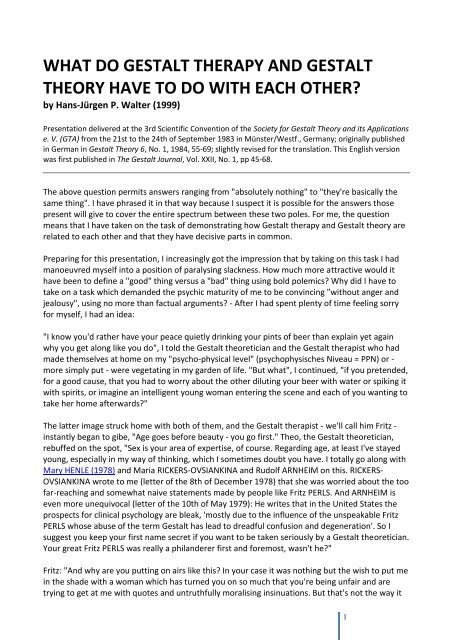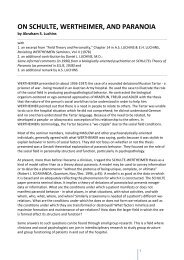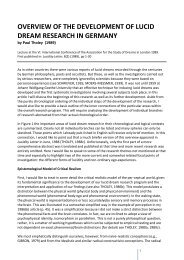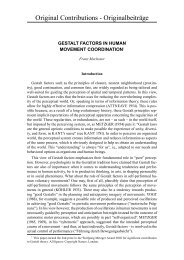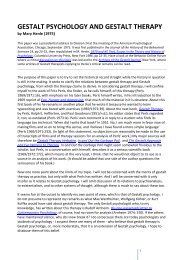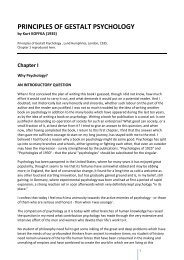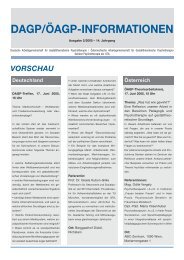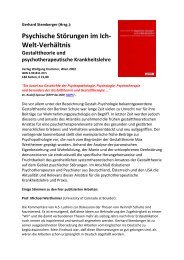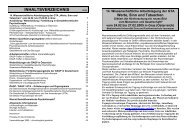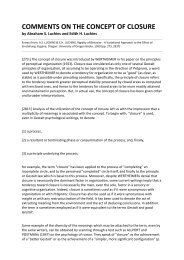pdf-Download - Society for Gestalt Theory and its Applications (GTA)
pdf-Download - Society for Gestalt Theory and its Applications (GTA)
pdf-Download - Society for Gestalt Theory and its Applications (GTA)
Create successful ePaper yourself
Turn your PDF publications into a flip-book with our unique Google optimized e-Paper software.
WHAT DO GESTALT THERAPY AND GESTALT<br />
THEORY HAVE TO DO WITH EACH OTHER?<br />
by Hans-Jürgen P. Walter (1999)<br />
Presentation delivered at the 3rd Scientific Convention of the <strong>Society</strong> <strong>for</strong> <strong>Gestalt</strong> <strong>Theory</strong> <strong>and</strong> <strong>its</strong> <strong>Applications</strong><br />
e. V. (<strong>GTA</strong>) from the 21st to the 24th of September 1983 in Münster/Westf., Germany; originally published<br />
in German in <strong>Gestalt</strong> <strong>Theory</strong> 6, No. 1, 1984, 55-69; slightly revised <strong>for</strong> the translation. This English version<br />
was first published in The <strong>Gestalt</strong> Journal, Vol. XXII, No. 1, pp 45-68.<br />
The above question perm<strong>its</strong> answers ranging from "absolutely nothing" to "they're basically the<br />
same thing". I have phrased it in that way because I suspect it is possible <strong>for</strong> the answers those<br />
present will give to cover the entire spectrum between these two poles. For me, the question<br />
means that I have taken on the task of demonstrating how <strong>Gestalt</strong> therapy <strong>and</strong> <strong>Gestalt</strong> theory are<br />
related to each other <strong>and</strong> that they have decisive parts in common.<br />
Preparing <strong>for</strong> this presentation, I increasingly got the impression that by taking on this task I had<br />
manoeuvred myself into a position of paralysing slackness. How much more attractive would it<br />
have been to define a "good" thing versus a "bad" thing using bold polemics? Why did I have to<br />
take on a task which dem<strong>and</strong>ed the psychic maturity of me to be convincing "without anger <strong>and</strong><br />
jealousy", using no more than factual arguments? - After I had spent plenty of time feeling sorry<br />
<strong>for</strong> myself, I had an idea:<br />
"I know you'd rather have your peace quietly drinking your pints of beer than explain yet again<br />
why you get along like you do", I told the <strong>Gestalt</strong> theoretician <strong>and</strong> the <strong>Gestalt</strong> therapist who had<br />
made themselves at home on my "psycho-physical level" (psychophysisches Niveau = PPN) or -<br />
more simply put - were vegetating in my garden of life. "But what", I continued, "if you pretended,<br />
<strong>for</strong> a good cause, that you had to worry about the other diluting your beer with water or spiking it<br />
with spir<strong>its</strong>, or imagine an intelligent young woman entering the scene <strong>and</strong> each of you wanting to<br />
take her home afterwards?"<br />
The latter image struck home with both of them, <strong>and</strong> the <strong>Gestalt</strong> therapist - we'll call him Fritz -<br />
instantly began to gibe, "Age goes be<strong>for</strong>e beauty - you go first." Theo, the <strong>Gestalt</strong> theoretician,<br />
rebuffed on the spot, "Sex is your area of expertise, of course. Regarding age, at least I've stayed<br />
young, especially in my way of thinking, which I sometimes doubt you have. I totally go along with<br />
Mary HENLE (1978) <strong>and</strong> Maria RICKERS-OVSIANKINA <strong>and</strong> Rudolf ARNHEIM on this. RICKERS-<br />
OVSIANKINA wrote to me (letter of the 8th of December 1978) that she was worried about the too<br />
far-reaching <strong>and</strong> somewhat naive statements made by people like Fritz PERLS. And ARNHEIM is<br />
even more unequivocal (letter of the 10th of May 1979): He writes that in the United States the<br />
prospects <strong>for</strong> clinical psychology are bleak, 'mostly due to the influence of the unspeakable Fritz<br />
PERLS whose abuse of the term <strong>Gestalt</strong> has lead to dreadful confusion <strong>and</strong> degeneration'. So I<br />
suggest you keep your first name secret if you want to be taken seriously by a <strong>Gestalt</strong> theoretician.<br />
Your great Fritz PERLS was really a phil<strong>and</strong>erer first <strong>and</strong> <strong>for</strong>emost, wasn't he?"<br />
Fritz: "And why are you putting on airs like this? In your case it was nothing but the wish to put me<br />
in the shade with a woman which has turned you on so much that you're being unfair <strong>and</strong> are<br />
trying to get at me with quotes <strong>and</strong> untruthfully moralising insinuations. But that's not the way it<br />
1
works. I won't even get involved in a discussion about Fritz PERLS as a person. Look at your own<br />
horn! I'll start from an entirely different angle: Maybe you really haven't quite realised yet that<br />
<strong>Gestalt</strong> therapy has got <strong>Gestalt</strong> theory down from <strong>its</strong> academic ivory-tower where it might<br />
otherwise have continued to prove the ideas so revolutionary <strong>for</strong> human sciences on simple<br />
geometrical shapes until Doomsday. And I do mean 'revolutionary ideas'; but you had adjusted so<br />
well to this entire scientific ado which is so intent on pseudo-exactitude (including <strong>its</strong> elitist<br />
arrogance) <strong>and</strong> poses on the pedestal of alleged objectivity, that there was hardly anything left of<br />
the humanist notions of the holistic approach."<br />
"All right, I'll get down to the facts now," said Theo. "But first I'd like to point out that your matterof-factness<br />
wasn't exactly truthful. Academic <strong>Gestalt</strong> theory has never been as daft as you made it<br />
out to be, but I'll come back to that. The fact is that <strong>Gestalt</strong> therapy has developed into an<br />
irrational movement of salvation. In view of this I'd rather stay up in my ivory-tower of precise<br />
abstraction. I don't want anything to do with this humanist nonsense where holistic means that<br />
everything is somehow related to everything else!"<br />
Listening to Theo <strong>and</strong> Fritz going on about their views I'm beginning to get impatient; they<br />
obviously need a mediator if there is to be a chance of initiating a factual dispute. The role-play<br />
seems to have become quite serious. "You two, I'd like to ask you a few questions now <strong>and</strong> make<br />
sure you stick to the subject. Firstly: Why is <strong>Gestalt</strong> therapy actually called <strong>Gestalt</strong> therapy?"<br />
Fritz: "PERLS called it that deliberately. According to him his theoretical knowledge <strong>and</strong> practical<br />
experiences which gained crucial importance <strong>for</strong> the articulation of his criticism of psychoanalysis<br />
<strong>and</strong> <strong>for</strong> the description of his own therapeutic method are owing to his encounter with <strong>Gestalt</strong><br />
theory. He wrote, 'I am indebted to Professor K. GOLDSTEIN <strong>for</strong> first introducing me to <strong>Gestalt</strong><br />
psychology. Un<strong>for</strong>tunately, in 1926 when I was working at the neurological institute in Frankfurt I<br />
was still too preoccupied with the orthodox psychoanalytical method, <strong>and</strong> was there<strong>for</strong>e only able<br />
to absorb a fraction of what I was offered' (PERLS, 1942, cited from German edition, 1978, 9;<br />
Vorwort aus dem Jahr 1942). But even if he hadn't been to lectures of <strong>Gestalt</strong> theoreticians as a<br />
medical student in Berlin, he certainly attended a few in Frankfurt, held by Adhémar GELB (who<br />
supervised the dissertation of his wife Lore) <strong>and</strong> probably also by WERTHEIMER, to whom he<br />
dedicated his first book (Ego, Hunger <strong>and</strong> Aggression, first published in South Africa in 1942, in<br />
Engl<strong>and</strong> in 1947) when he began to realise the importance of his experiences with <strong>Gestalt</strong><br />
theoreticians. Whenever he starts talking about the basics of his own psychotherapeutic approach,<br />
he refers to views <strong>and</strong> terms pertaining to <strong>Gestalt</strong> theory!"<br />
Theo interrupts, "I'm having to restrain myself. You want to prove that after psychoanalysis<br />
<strong>Gestalt</strong> theory became <strong>and</strong> remained his psychological habitat. That may be, but I've also heard<br />
that GOLDSTEIN was a wee bit embarrassed when he later discovered PERLS among his listeners in<br />
the United States. ARNHEIM talks about the 'entirely unauthorised usurpation of this name (i.e.<br />
that of the term <strong>Gestalt</strong>) through Fritz PERLS' (personal message of the 11th of December 1979). -<br />
A touch of <strong>Gestalt</strong> theoretical 'stable odour' mixed with psychoanalysis - PERLS (1969, 4) even<br />
adm<strong>its</strong> to not having read most of FREUD's books <strong>and</strong> even fewer <strong>Gestalt</strong> theoretical papers.<br />
Basically you've got a mixture of two different fragrances which at best serve to produce a<br />
perfume. Psychoanalysts should be grateful that he has chosen <strong>Gestalt</strong> theory <strong>for</strong> his disavowal."<br />
Fritz: "Let me start with the 'stable odour'. I don't think so little of it. Whoever has got his nose<br />
filled with the right intimate scent can never be totally wrong in his judgement of where his home<br />
is. [For further discussion of this proposition compare METZGER's (1963, 2. Kap.) deliberations about the term<br />
2
"Wesenseigenschaften" (physiognomic or expression characteristics of a <strong>Gestalt</strong> as a whole), as distinguished from<br />
material characteristics <strong>and</strong> structural characteristics.] And that's what it was like <strong>for</strong> Fritz PERLS as well. He<br />
realized the significance the <strong>Gestalt</strong> theoretical approach gains <strong>for</strong> people, <strong>for</strong> the individual as<br />
well as <strong>for</strong> the community, provided it is systematically translated into practical therapeutic action.<br />
Who among the <strong>Gestalt</strong> theoreticians, apart from Kurt LEWIN after his emigration, has engaged<br />
with the confusing diversity of immediate human relationships?"<br />
Theo: "Surely, there have been other approaches: the old paper by SCHULTE (1924) titled 'An<br />
Attempt at a <strong>Theory</strong> of the Paranoid Idea of Reference <strong>and</strong> Delusion Formation'; LUCHINS (e.g.<br />
1949, 1964) <strong>and</strong> FROMM-OPPENHEIMER (e.g., 1968) studied clinical psychology in the United<br />
States, almost simultaneously with PERLS; ARNHEIM engaged in critical analysis of the arts <strong>and</strong> the<br />
film medium (cf., e.g., 1978); <strong>and</strong> there are a number of philosophical, almost psychotherapeutic<br />
<strong>and</strong> political publications by Max WERTHEIMER in the United States (1934, 1935, 1937, 1940)..."<br />
Fritz: "... which no German <strong>Gestalt</strong> theoretician has found relevant enough to be translated, not<br />
even Wolfgang METZGER who has after all translated Productive Thinking (WERTHEIMER, 1964)<br />
<strong>and</strong> whose profound agreement with his teacher WERTHEIMER is supported by his important<br />
book Creative Freedom (Schöpferische Freiheit, 1962). You could actually talk to METZGER about<br />
<strong>Gestalt</strong> therapy without him immediately turning up his nose. But apart from that, most German<br />
<strong>Gestalt</strong> theoreticians disowned their own fathers after the war unless papers fitted tolerably into<br />
the paradigm of experimental statistophilia, to coin a new term. And even in the United States<br />
neither WERTHEIMER nor LUCHINS achieved any acclaim or influence with the above mentioned<br />
treatises. [It would indeed be interesting to draw a comparison between Mary HENLE's views about the position of<br />
<strong>Gestalt</strong> theory (1978) <strong>and</strong> the propositions of Michael WERTHEIMER, Max WERTHEIMER's son, about his father's<br />
underst<strong>and</strong>ing of the <strong>Gestalt</strong> approach (1980, also contained in Max WERTHEIMER, 1991)]<br />
Of course I'll readily concede that PERLS wasn t the incarnation of <strong>Gestalt</strong> theory pure <strong>and</strong> simple<br />
(who is?), but he has impressed so many people in his concrete work with them that they have<br />
spread - <strong>and</strong> who could be surprised at it? - even his theoretical inconsistencies <strong>and</strong> have on top of<br />
that, according to the principles of the development of rumours, distorted whatever was indeed<br />
acceptable. These people shouldn't have been deserted. Mary HENLE's public discussion of PERLS<br />
in 1978, demonstrating remarkable passion <strong>and</strong> the obviously irrevocable intention of tearing him<br />
to pieces, came at least 20 years too late. Was LEWIN's fate any different in respect of the delay of<br />
discussion? No! And this has resulted in the fact that many representatives of group dynamics<br />
refer to him even though they have at best read his last programmatical papers, but have no idea<br />
about his <strong>Gestalt</strong> theoretical background (Jörg FENGLER, personal message to Jürgen STEINKOPFF<br />
of the 2nd of December 1977), which in turn has inflationary tendencies when it comes to theory<br />
<strong>and</strong> practice in this field. The group dynamics research of LEWIN hardly existed <strong>for</strong> academic<br />
<strong>Gestalt</strong> theoreticians. And this split too had already started in the United States."<br />
Theo: "You've mentioned METZGER. He had reviewed the American LEWIN rather early on (cf.<br />
1963, 1975). And very positively. And don't <strong>for</strong>get also many of those here present." -<br />
"Right, let me interrupt you two once more. I'm finding all this reasonably interesting, but in<br />
regard to the topic I gave to you it seems a bit like talking about the world <strong>and</strong> his wife.<br />
But your conversation has made me realise one important thing: It seems to me that <strong>Gestalt</strong><br />
theoreticians of all orientations are to blame to some extent <strong>for</strong> the dissociated development of<br />
their own approach. After the dispersion of the <strong>for</strong>mer centres of <strong>Gestalt</strong> theory by the racist civil<br />
service legislation of the Nazis, too many theoreticians considered their own pile of muck to be the<br />
best <strong>and</strong> preferred to 'leave the field' when a realisation of the (lip) service to the whole <strong>and</strong> the<br />
3
differentiation of <strong>Gestalt</strong> characteristics would have required laborious <strong>and</strong> careful analysis of the<br />
achievements of others. So now I'd like to ask you, Fritz: Which <strong>Gestalt</strong> theoretical views <strong>and</strong><br />
concepts does PERLS rely on?"<br />
Fritz: "Well, I can think of so many that I hardly know where to start. No, I do, I'll start with a quote<br />
which has only recently come to my attention in PERLS's autobiography In <strong>and</strong> Out the Garbage<br />
Pail (1969, unpaginated, pp. 6-9, beginning with the author's text). In it he comments on 'selfactualization':<br />
'Self-actualization is a modest term. It has been glorified <strong>and</strong> distorted by hippies, artists, <strong>and</strong>, I am sorry to say, by<br />
many humanistic psychologists. It has been put <strong>for</strong>th as a program <strong>and</strong> achievement. This is the result of reification,<br />
the need to make a thing out of a process. In this case it even means to deify <strong>and</strong> glorify a locus, <strong>for</strong> self indicates<br />
merely a 'where' of happening, self to be contrasted (<strong>and</strong> making sense only through this contrast) with otherness.<br />
... A wheat germ has the potential of becoming a plant <strong>and</strong> the wheat plant is <strong>its</strong> actualization.<br />
Now: self actualization means the wheat will actualize <strong>its</strong>elf as a wheat plant <strong>and</strong> never as a rye plant.<br />
... No eagle will want to be an elephant, no elephant to be an eagle. They 'accept' themselves; they accept them-<br />
'selves'. No, they don't even accept themselves, <strong>for</strong> this would mean possible rejection. They take themselves <strong>for</strong><br />
granted, No, they don't even take themselves <strong>for</strong> granted, <strong>for</strong> this would imply a possibility of otherness. They just are.<br />
They are what they are what they are.<br />
How absurd it would be if ... the eagle wanted to have the strength <strong>and</strong> thick skin of the beast.<br />
Leave this to the human - to try to be something he is not - to have ideals that cannot be reached, to be cursed with<br />
perfectionism so as to be safe from criticism, <strong>and</strong> to open the road to unending mental torture.<br />
The gap between one's potential <strong>and</strong> <strong>its</strong> actualization on the one side of the ledger, <strong>and</strong> the distortion of this<br />
authenticity on the other, becomes apparent. 'Shouldism' rears <strong>its</strong> ugly head. We 'should' eliminate, disown, repress,<br />
negate many features <strong>and</strong> sources of genuineness <strong>and</strong> add, pretend, play at, develop roles unsupported by our élan<br />
vital, resulting in phony behavior of different degrees. Instead of the wholeness of a real person, we have the<br />
fragmentation, the conflicts, the unfelt despair of the paper people.<br />
Homeostasis, the subtle mechanism of the self-regulating <strong>and</strong> self-controlling organism, is replaced by an external<br />
superimposed control-madness undermining the survival value of the person <strong>and</strong> the species. Psychosomatic<br />
symptoms, despondency, lassitude <strong>and</strong> compulsive behavior replace the joie de vivre.<br />
The deepest split, long ingrained in our culture <strong>and</strong> thus taken <strong>for</strong> granted, is the mind/body dichotomy: the<br />
superstition that there is a separation, yet interdependency, of two different kinds of substance, the mental <strong>and</strong> the<br />
physical. ...<br />
... We are organisms, we (...) do not have an organism. We are one wholesome unit, but we are at liberty to abstract<br />
many aspects from this totality. Abstract, not subtract, not split off. We can abstract, according to our interest, the<br />
behavior of that organism or <strong>its</strong> social function or <strong>its</strong> physiology or <strong>its</strong> anatomy or this or that, but we have to stay<br />
alert <strong>and</strong> not take any abstraction <strong>for</strong> a 'part' of the total organism. ... We can have a compositum of abstractions, we<br />
can approximate the knowing of a person or a thing, but we never can have the total awareness of (to talk in Kantian<br />
language) das Ding an sich, the thing <strong>its</strong>elf.<br />
Am I becoming too philosophical?'"<br />
"Indeed, indeed," sneers Theo who had begun to shake his head vehemently towards the end of<br />
the quote. But Fritz isn't quite ready to h<strong>and</strong> over to him: "Just bear with me a wee bit longer,<br />
then you may start to scoff. But be<strong>for</strong>e you do I'd like to propose a few theses in relation to this<br />
quote:<br />
4
"1. PERLS's underst<strong>and</strong>ing of the term 'self-actualization' corresponds to what METZGER <strong>and</strong><br />
WERTHEIMER call 'freedom' or 'creative freedom' (e.g. METZGER, 1962, 82ff.), especially with<br />
regard to PERLS's criticism of aberrations in so-called humanist psychology as well as in his mental<br />
proximity to Far Eastern practical philosophy. All three of them view meaningful self-actualization<br />
as the unfolding of a person's potential without external pressure such as rigid rules <strong>and</strong> without<br />
disregarding the general human <strong>and</strong> the individual possibilities (cf. METZGER, 1962, 22, 26, 75,<br />
84).<br />
"2. PERLS's underst<strong>and</strong>ing of self-actualization follows, like that of METZGER <strong>and</strong> WERTHEIMER,<br />
from the system- <strong>and</strong> field-theoretical view of <strong>Gestalt</strong> theory as it is represented by KÖHLER (cf.<br />
THOLEY, 1982). It is within the frame of this view that his discussion of homeostasis, of the 'subtle<br />
mechanism of the self-regulating organism', <strong>and</strong> of the 'control-madness' have their place.<br />
"3. PERLS represents a psycho-physical approach based on his experiences with the <strong>Gestalt</strong><br />
theoretically oriented neurologist GOLDSTEIN which, although the terminology may have been<br />
simplified, does justice to the <strong>Gestalt</strong> approach in the consequences it has <strong>for</strong> practical therapeutic<br />
work (i.e. on a level of immediate phenomena).<br />
"4. In the final part of the quote PERLS discusses the feasibility <strong>and</strong> the possible benef<strong>its</strong> of an<br />
abstracting discussion of aspects of human wholeness; this part proves PERLS's epistemological<br />
affinity to a 'critical realism': Implicitely he differentiates between a naive-phenomenal world, a<br />
critical-phenomenal world (which is the physical view of life gained by abstraction), <strong>and</strong> a<br />
transphenomenal world of 'the thing <strong>its</strong>elf' (cf. THOLEY, 1980 a).<br />
"5. In conclusion we can say that psychotherapeutic practice which logically takes into account the<br />
views proposed in PERLS's text may rightfully refer to <strong>Gestalt</strong> theory. Furthermore I posit<br />
(substantiated by the session protocols in PERLS, 1974) that the practice of PERLSian <strong>Gestalt</strong><br />
therapy undoubtedly shows that he has followed the right intimate scent. He integrates<br />
experiment, wholeness, <strong>and</strong> phenomenology, the holy Trinity of <strong>Gestalt</strong> theoretical research<br />
methodology, into an atmosphere permitting a person to breathe the air of freedom, which, as<br />
WERTHEIMER said once, can seem like recuperation after a long illness (1940).<br />
Right, my dear Theo, thank you <strong>for</strong> letting me finish. Over to you now."<br />
Theo seems a bit miffed, to put it colloquially. He mutters sullenly, "You didn't leave me much of a<br />
chance to get a word in edgeways, did you?" And: "We didn't agree on your making a speech!<br />
Mister mediator! How am I supposed to refute all of what Fritz said at once?"<br />
"Just give it a go," I say to him. Theo gives me a withering look which suggests that in the future he<br />
may want to go back to addressing me by my surname after years of being on first-name terms.<br />
Then suddenly a big grin appears on his face. "Hello!" he beams. "You two have chosen the perfect<br />
time to make your appearance. That's what my PPN-people, who are more intelligent than I am,<br />
are <strong>for</strong>. Now then, this is Paul (THOLEY) <strong>and</strong> that is Friedrich (HOETH). You've been listening,<br />
haven't you?" "Absolutely," comes the reply from these two friends <strong>and</strong> <strong>for</strong>mer colleagues at the<br />
institute under Edwin RAUSCH in Frankfurt (who supervised their dissertations). Friedrich adds,<br />
"That's okay," <strong>and</strong> Paul doesn't refuse to take part in the discussion either, but remarks<br />
thoughtfully, "Yes, but I wonder if it wouldn't have been more accurate to speak of second order<br />
5
PPN." - Fritz whispers into my ear, "Do you think Theo is aware that he's saving himself by using<br />
<strong>Gestalt</strong> therapeutic methodology?" I look at him sternly; after all I'm impartial here.<br />
"Well, I shall go ahead <strong>and</strong> start then," said Friedrich, "but you..." - he addresses me directly <strong>and</strong><br />
I'm wondering whether I'm going to have double vision in a minute; oh dear, this is going to be<br />
fun; just stick with the theory, I'm thinking; I can't h<strong>and</strong>le third order PPN-people to enter the<br />
scene. I'm signalling inconspicuously to Fritz to mobilise his concentrated therapeutic competence<br />
- if the worst comes to the worst - to prevent an overwhelming confusion of roles.<br />
"But you," repeats Friedrich, "I was going to tell you something first: I've read Hilarion PETZOLD's<br />
article (1978) in Psychologie Heute, <strong>and</strong> I don't quite know what to think of it except that she really<br />
hasn't got a clue about <strong>Gestalt</strong> theory. Everything she says about it is odd - <strong>and</strong> this is putting it<br />
mildly as bef<strong>its</strong> a lady. But then she's a <strong>Gestalt</strong> therapist too, isn't she?" (personal message of the<br />
24th of November 1979).<br />
That's the last thing I needed, Friedrich saying this. I notice that I'm biased after all <strong>and</strong> quite liked<br />
Fritz's arguments.<br />
"First of all, Friedrich," I tell him, "the lady is not a lady, but a gentleman. Secondly, Hilarion was<br />
my most important trainer of <strong>Gestalt</strong> therapy who taught me - let's be honest - a great deal in my<br />
personal development <strong>and</strong> <strong>Gestalt</strong> therapeutic practice. And thirdly, God knows why he has made<br />
public his insufficient knowledge about <strong>Gestalt</strong> theory [f. 3] - especially by saying that <strong>Gestalt</strong><br />
theory lacked a theory of values - <strong>and</strong>, moreover, denied what PERLS himself has acknowledged,<br />
i.e. that the latter views <strong>Gestalt</strong> theory, side by side with his experiences with psychoanalysis, as<br />
the primary basis of his practice. I suppose that only goes to show how crucial it is to make sure<br />
that the label '<strong>Gestalt</strong>' must not be allowed to apply to just anything. Hence I would ask you to<br />
restrict yourselves to Fritz PERLS. Only if the founder of <strong>Gestalt</strong> therapy can be exposed as a<br />
pseudo <strong>Gestalt</strong>ist, does it seem fit <strong>for</strong> <strong>Gestalt</strong> theorists to dissociate themselves from <strong>Gestalt</strong><br />
therapy."<br />
"Well," retorts Friedrich, "I wouldn't exactly call PERLS a wind-bag. On the contrary. I was almost<br />
convinced by what Fritz was saying. There is definitely something in this proposition. Incidentally, I<br />
have just finished reading the two volumes by PERLS, HEFFERLINE <strong>and</strong> GOODMAN. There are quite<br />
a few hitches when it comes to the details of <strong>Gestalt</strong> theoretical reasoning. And referring to the<br />
earlier quote: There exists an unusual contradiction between the part Fritz uses as evidence that<br />
PERLS is a critical realist - although the evidence in <strong>and</strong> of <strong>its</strong>elf is quite good - <strong>and</strong> the part PERLS<br />
uses earlier <strong>for</strong> distinguishing between the physical <strong>and</strong> the psychical. The two don't fit together.<br />
The difference between the phenomenal <strong>and</strong> the objective-physical realities, which is constantly<br />
emphasised by <strong>Gestalt</strong> theory, is blurred; KÖHLER <strong>and</strong> METZGER's elaborations pertaining to the<br />
mind-body problem are ignored" (HOETH, 1980, 116).<br />
Paul adds, "In the very first sentence of their book, PERLS, HEFFERLINE <strong>and</strong> GOODMAN note,<br />
'Experience takes place at the boundary between the organism <strong>and</strong> <strong>its</strong> environment, primarily on<br />
the surface of the skin <strong>and</strong> other organs of sensory perception <strong>and</strong> motori reaction.' When talking<br />
about the surface of the skin <strong>and</strong> other organs of sensory perception the authors are obviously<br />
referring to the boundary between the physical organism <strong>and</strong> <strong>its</strong> physical environment. However,<br />
according to the critical-realistic view experience does not take place there, but within the<br />
phenomenal world which is based on cortical processes in the PPN. The contamination of<br />
phenomenal <strong>and</strong> physical circumstances becomes visible in the way the term<br />
6
'organism/environment-field' (<strong>for</strong> example, 228) is used in so far as according to the system<br />
theoretical views of <strong>Gestalt</strong> theory the phenomenal ego <strong>and</strong> <strong>its</strong> phenomenal environment are<br />
indeed connected in a field-like context of effects, whereas circular regulation processes are<br />
responsible <strong>for</strong> the interaction between the physical organism <strong>and</strong> the physical environment. The<br />
impermissible transference of the term 'field' <strong>and</strong> other categories, which were originally designed<br />
to describe <strong>and</strong> explain processes in the phenomenal world, to the entire organism <strong>and</strong> beyond it<br />
to the physical environment is characteristic (according to BISCHOF) of a semi-naive<br />
phenomenologism. PERLS was probably inspired towards this by his acquaintance with GOLDSTEIN<br />
who holds similar views in this respect" (THOLEY, 1980, 183/314).<br />
Theo says thoughtfully, "We acknowledge GOLDSTEIN's achievements in neurological research <strong>and</strong><br />
practice, although he may not always have been a critical-realistic genius; then that imperfection is<br />
no reason to discard PERLS's achievements. On the other h<strong>and</strong>," he adds, addressing Fritz , "it has<br />
become clear even at this stage from what Friedrich <strong>and</strong> Paul have said that not a single one of<br />
your five theses is entirely waterproof. There are little hitches everywhere with the theoretician<br />
PERLS; he lacks consequence <strong>and</strong> stringency. Hence it is underst<strong>and</strong>able why so much <strong>Gestalt</strong><br />
gibberish has developed alongside <strong>Gestalt</strong> therapy.<br />
"Let's consider your first thesis, <strong>for</strong> instance: I'm not sure whether METZGER agrees with PERLS's<br />
underst<strong>and</strong>ing of self-actualization when he says, 'In the domain of living creatures only those<br />
<strong>for</strong>ms will achieve long duration which are created through the unfolding of internal <strong>for</strong>ces <strong>and</strong><br />
are supported <strong>and</strong> renewed by these <strong>for</strong>ces' (1962, p. 26). I can sense underlying tones with PERLS<br />
sounding somewhat like: Be like the wheat grain, like the eagle, or the elephant. I get the<br />
impression he's not only turning against 'control-madness', but even against simply thinking about<br />
oneself. Proclaiming the identity of the physical <strong>and</strong> the psychical he overshoots KÖHLER's<br />
presupposition of isomorphia by far. Such a view can at best be regarded as a peculiarity of Fritz<br />
PERLS's phenomenal world or as the pious wish to find peace within himself: he'd like this identity<br />
to exist because it would make life so much easier <strong>for</strong> him <strong>and</strong> <strong>for</strong> his work with clients."<br />
"Exactly," Friedrich breaks in, "I got the very same impression with PERLS, HEFFERLINE <strong>and</strong><br />
GOODMAN. But first of all, concerning self-actualization, a few crucial differences in relation to the<br />
term are mentioned. First <strong>and</strong> <strong>for</strong>emost there is the difference between 'becoming aware' <strong>and</strong><br />
'introspection': the latter disturbs self-regulation of the psycho-physical system by the<br />
interference of an 'intentional ego'. Also there is the difference between 'assimilation', i.e. the<br />
genuine incorporation of certain attitudes, views, <strong>and</strong> dem<strong>and</strong>s into one's own psycho-physical<br />
system, as opposed to 'introjection', which is the intake of entire 'unchewed chunks' of theories<br />
<strong>and</strong> dem<strong>and</strong>s <strong>for</strong>ced on us by the authorities which remain undigested in the stomach of the<br />
psycho-physical system." -<br />
"But it's indeed in the light of this irreconcilable opposition of assimilation <strong>and</strong> introjection,"<br />
interrupts Theo, "that PERLS's sentence 'Shouldism' rears <strong>its</strong> ugly head' becomes suspect. I can<br />
literally hear all the allegedly so very 'humanistic' egoists reciting:<br />
'You are you <strong>and</strong> I am I,<br />
And if by chance we find each other, it's beautiful.<br />
If not, it can't be helped' (PERLS, 1969, 4).<br />
As if there wasn't anything between. As if you couldn't approach someone <strong>and</strong> get used to them<br />
voluntarily without getting a dodgy stomach from it."<br />
7
"I was just coming to that," continues Friedrich. "PIAGET has suggested that the nature of<br />
intelligence (I'd call it the principle of steady productive solutions to problems) is in the balance<br />
between assimilation <strong>and</strong> accommodation (i.e. the adjustment of one's own categories to the<br />
peculiarities of the 'stranger' with whom one enters into a relationship). Hence I would like to say<br />
to PERLS - though, in contrast to you, Theo, I'm only referring to the theoretical part of his work: In<br />
spite of the justified rejection of a process which is nothing but the <strong>for</strong>ced 'introjection' of<br />
indigestible chunks, the regulating process of accommodation, i.e. the adjustment of one's own<br />
categories of recognition to the factual structure of what is to be recognised (e.g. the present<br />
terminology of <strong>Gestalt</strong> theory) is greatly neglected in a tendency towards exuberant assimilation<br />
(1980, p. 116). This becomes especially salient, <strong>for</strong> instance, when PERLS, HEFFERLINE <strong>and</strong><br />
GOODMAN name the <strong>Gestalt</strong> theoretical differentiation between figure <strong>and</strong> ground as the basic<br />
concept of <strong>Gestalt</strong> therapy <strong>and</strong> <strong>its</strong> underst<strong>and</strong>ing of psychical processes. It is obvious that in this<br />
presupposition the <strong>Gestalt</strong> theoretical concepts of figure/ground on the one h<strong>and</strong> <strong>and</strong> centering<br />
on the other are confused, <strong>and</strong> thus the concept of figure/ground is strained to the point of<br />
becoming unfathomable (simply because it is really centering which is talked about). -In this socalled<br />
theoretical foundation of <strong>Gestalt</strong> therapy we have to look <strong>for</strong> clearly stated findings amidst<br />
this flood of assimilation, <strong>and</strong> there are indeed things to be discovered:<br />
"1. It appears to me that the necessary, but at the same very difficult integration of <strong>Gestalt</strong> theory<br />
<strong>and</strong> psychoanalysis has been successful despite the occasional hitch when it comes to a precise<br />
terminology. This is a huge step <strong>and</strong> the reason why the volume concerned with practical matters<br />
(the second volume by PERLS, HEFFERLINE <strong>and</strong> GOODMAN) is so fascinating.<br />
"2. I found the explanations in the volume about practical matters gripping <strong>and</strong> very enlightening.<br />
The book contains a fascinating demonstration of how an increasing awareness of the perception<br />
of external circumstances leads to an increasing awareness of internal processes. This makes clear<br />
the connection, perhaps even unity, of 'purely' perceptive, emotional, <strong>and</strong> motor processes, which<br />
constitutes a phenomenon which has not been sufficiently emphasised by the Berlin School of<br />
<strong>Gestalt</strong> theory, even though it was never overlooked. I have got to accept this criticism coming<br />
from PERLS <strong>and</strong> his colleagues even though I am a follower of the Berlin School myself (HOETH,<br />
1980, 116).<br />
"I used to have another suspicion - i.e. that PERLS tempted his patients into becoming assimilation<br />
fanatics -, but have not been able to find evidence <strong>for</strong> this, either. On the contrary: PERLS, who is a<br />
brilliant phenomenologist, implies in his practical explanations <strong>and</strong> quite possibly also in his<br />
practical therapy the duty of others towards accommodation by dem<strong>and</strong>ing that they develop<br />
categories of perception which would make possible an awareness of the phenomena, which<br />
become clear in his view. - Perhaps the therapeutic practitioner PERLS is ahead of the theoretician<br />
PERLS? - Integration is certainly necessary. I believe that so-called academic psychology ought to<br />
deal with PERLS's work in great detail (1980, 117).<br />
That's it <strong>for</strong> the moment," closes Friedrich. "You're a tolerant man," remarks Theo with a quick<br />
side-glance at Fritz. The latter underst<strong>and</strong>s what is meant by it <strong>and</strong> suggests, "Perhaps Paul is yet<br />
to roast me."<br />
Paul: "That's not the point, but there is something which I do think is important: In <strong>Gestalt</strong> therapy<br />
dreams play a crucial role. PERLS calls the dream the 'royal way to integration' in an attempt to<br />
distinguish himself as a <strong>Gestalt</strong> theoretician from FREUD, who called it the 'royal way to the<br />
unconscious'. However, PERLS remains rooted in psychoanalysis <strong>and</strong> basically in the same<br />
8
epistemological weaknesses as FREUD by straining the concept of unconscious projections. For<br />
him every part of the dream - people, animals, plants etc. - is a projection of alienated aspects of<br />
the personality. I think it's a shame that one of the most important aspects of <strong>Gestalt</strong> therapeutic<br />
work - i.e. dream work - is burdened with a discrepant theoretical foundation.<br />
"For the critical realist there is absolutely no reason to consider all parts of a dream to be<br />
projections, just as there is no reason to view the waking perceptions of psychical processes within<br />
the phenomenal environment - e.g. another person's mood - as such projections. Such a view is<br />
the result of what we have mentioned be<strong>for</strong>e, which is blending the objective appearing world of<br />
perception (which belongs to the phenomenal world of a person) with the physical world."<br />
"Yes," Theo adds, "so whether we're dealing with the perception of a figural fact, like a rectangle,<br />
or the perception of the physical existence of a person on the one h<strong>and</strong>, or with the perception of<br />
a so-called psychical fact, like a solemn or a happy tune or the sadness of another person, on the<br />
other h<strong>and</strong>, neither example is a case of objective facts in terms of the physical world. Both cases<br />
are psychical facts, i.e. processes within the psychical world of a person. Hence the accusation that<br />
<strong>Gestalt</strong> theory has examined perception, but hardly any psychical processes, reveals gross<br />
ignorance.<br />
"Perception of any kind is a psychical process. There<strong>for</strong>e, the stock of knowledge <strong>Gestalt</strong> theory<br />
has enabled about figural perception as well as thinking or emotions is of immediate importance<br />
to our underst<strong>and</strong>ing of psychical processes. We don't need analogous conclusions, like it has<br />
been suggested; although we have to own that the same basic principles, the so-called <strong>Gestalt</strong><br />
laws, will produce different results according to the circumstances <strong>and</strong> the material."<br />
"That's a truism, though, isn't it!" Friedrich interrupts sharply. "Of course the consequences will<br />
differ according to whether it's two people or two matches which get together under the law of<br />
proximity. Who needs to have that explained?! Oh, I just remembered who does." Fritz smiles:<br />
"And on top of that everyone who wants to be or become a <strong>Gestalt</strong> theoretical psychotherapist<br />
ought to know this by heart <strong>and</strong> be able to quote it any time."<br />
"Anyway," Friedrich continues, "in case I haven't made myself clear: PERLS makes use of this<br />
circumstance in the exercises he suggests to his clients in order to enhance their awareness.<br />
Suddenly he's right again in what he practices."<br />
"I'd like Paul to be able to finish his thoughts about dreams," I urge. "It's really very simple," Paul<br />
says. "According to critical realism the external position of dreams, i.e. the fact that people <strong>and</strong><br />
things appear outside of us in dreams just like they do when we're awake, doesn't need an<br />
explanation. Dreams deal with the same phenomenal world as our waking existence, except that<br />
assimilating new in<strong>for</strong>mation is restricted to the phenomenal body-ego. But a lot of what appears<br />
in our dreams we have seen previously. There<strong>for</strong>e it's unnecessary <strong>for</strong> us to project these<br />
appearances. This isn't to say, of course, that we don't still do 'project' (even though that is an<br />
epistemologically doubtful Freudian term) things <strong>for</strong> our own enjoyment or because of masochist<br />
tendencies as regards the characters of people in our dreams, <strong>for</strong> instance, or as to what they like<br />
or don't like, do <strong>for</strong> us or against us."<br />
"Yes," agrees Theo. "And this is where the epistemological weakness of <strong>Gestalt</strong> therapy like that of<br />
psychoanalysis can turn into disregarding every utterance of the patient as being a projection,<br />
which is what Alice MILLER (1981) complains about so vehemently." Fritz nods: "I'll admit that<br />
9
such undeveloped models of thinking can do harm; but on the other h<strong>and</strong>, if <strong>Gestalt</strong> therapeutic<br />
practice is serious about abstaining as a leader <strong>and</strong> participant from most interpretations, which is<br />
what PERLS dem<strong>and</strong>s, <strong>and</strong> putting the emphasis on allowing the patient to make his world<br />
accessible <strong>for</strong> himself (like <strong>for</strong> instance using the technique of the empty chair when the patient<br />
acts both as himself <strong>and</strong>, on the other chair, as his father), he'll be able to find out <strong>for</strong> himself what<br />
counts as a 'projection' <strong>and</strong> what doesn't. And even if the patient doesn't invent any additional<br />
negative tra<strong>its</strong> <strong>for</strong> his father <strong>and</strong> the latter really is the total dog he is made out to be, the<br />
important thing remains that the client makes up <strong>for</strong> a missed argument with his father <strong>and</strong> gets<br />
the chance to free himself from his 'unsettled business' as PERLS calls it, alluding to the theses by<br />
ZEIGARNIK <strong>and</strong> OVSIANKINA" (cf. JUNKER, 1960).<br />
"Don't think you have to break any more lances <strong>for</strong> <strong>Gestalt</strong> therapy," says Paul. "By pointing to the<br />
epistemological weaknesses of <strong>Gestalt</strong> therapy I'm not trying to detract from <strong>its</strong> mer<strong>its</strong> when it<br />
comes to psychotherapy. I agree with Friedrich: many <strong>Gestalt</strong> therapeutic principles are<br />
compatible with <strong>Gestalt</strong> theory; although it is only possible to make them understood in a<br />
satisfactory way from the viewpoint of that theory. But if PERLS, as he seems to do sometimes,<br />
dismisses 'intellectual thinking' as 'mind fucking', then I'd like to point out that such thinking,<br />
where you have to step outside your immediate reality to be able to view it critically from an<br />
eccentric st<strong>and</strong>point, is vital <strong>for</strong> research matters <strong>and</strong> <strong>for</strong> <strong>for</strong>mulating theories, which in turn helps<br />
therapeutic practice." (cf. THOLEY, 1980, 183f)<br />
Theo obviously doesn't want to repeat, this time addressing Paul while looking at Fritz, that the<br />
<strong>for</strong>mer is a tolerant person. Hence he says nothing at all <strong>and</strong> just stares straight ahead. The<br />
questioning of experts has worked out just the way I intended it, <strong>and</strong> the time I had is coming to<br />
an end anyway. Let me hence sum up: Fritz PERLS was a wretched <strong>and</strong> lousy <strong>Gestalt</strong> theoretician,<br />
(but at least he was a <strong>Gestalt</strong> theoretician) who, helped by an extraordinary sense of smell,<br />
developed into a noteworthy <strong>Gestalt</strong> practitioner (you may want to substitute 'sense of smell' with<br />
'intuition'). I suppose that's the advantage of some of your typical lazy students, who never take<br />
notes on what they are taught in lectures <strong>and</strong> tutorials, nor are able to tell you a day later what<br />
they thought important <strong>and</strong> interesting the day be<strong>for</strong>e. - I'll make one last suggestion: Let's do<br />
Fritz PERLS <strong>and</strong> ourselves a favour: lets do the unmentionable Fritz PERLS a favour by<br />
posthumously fulfilling his wish of being a "great" Fritz of <strong>Gestalt</strong> psychology <strong>and</strong> the one who<br />
<strong>for</strong>ced <strong>Gestalt</strong> theory to become an approach of clinical psychology <strong>and</strong> psychotherapy; <strong>and</strong> let's<br />
also do ourselves a favour by taking the precaution of speaking about <strong>Gestalt</strong> theoretical<br />
psychotherapy <strong>and</strong> - by taking seriously this small difference, the addition of the word 'theoretical'<br />
- so developing PERLS's approach in a way which will set it apart from all this world-wide <strong>Gestalt</strong><br />
gibberish. - I was originally going to finish here, but just now Fritz asks me, "So where is the<br />
intelligent woman?" "Why do you ask?" snaps Theo. - "Oh you two," I tell them, "you don't even<br />
exist, so why would an intelligent woman be interested in you? You're nothing but a 'projection'."<br />
"So you deceived us?" asks Theo <strong>and</strong> continues, shaking his head, "in that case I'd like an<br />
explanation as to how Paul <strong>and</strong> Friedrich arrived on my PPN." "There are still some questions left<br />
unanswered in <strong>Gestalt</strong> theory," I answer evasively. "And by the way, I like both of you. - But let's<br />
be serious. I wanted to tell you something else:<br />
"I've noticed that our discussion of the connection between <strong>Gestalt</strong> theory <strong>and</strong> <strong>Gestalt</strong> therapy<br />
was very different from those in my previous papers (1977a <strong>and</strong> b). First I thought there was a lot<br />
we'd missed out on in our discussion, <strong>for</strong> instance a remark on the fact that PERLS only uses a<br />
fraction of what <strong>Gestalt</strong> theory offers <strong>for</strong> therapeutic work; but I've since come to the conclusion<br />
that first of all anyone who's interested can read through these earlier papers, <strong>and</strong> secondly - <strong>and</strong><br />
10
that's why I'm glad that we've worked as a team - we argued in different directions whereas then,<br />
when I didn't yet have you to talk to, I always used to just interpret PERLS from a <strong>Gestalt</strong><br />
theoretical viewpoint. As a <strong>Gestalt</strong> theoretician I used to justify myself <strong>for</strong> also being a <strong>Gestalt</strong><br />
therapist, <strong>and</strong> as a <strong>Gestalt</strong> therapist I tried to prove that I was a <strong>Gestalt</strong> theoretician as well. I've<br />
really enjoyed this, <strong>and</strong> I'd like to thank both of you, as well as our active guests Paul <strong>and</strong> Friedrich,<br />
<strong>and</strong> all our non-active, but nonetheless present listeners." We would all like to thank you, ladies<br />
<strong>and</strong> gentlemen, <strong>for</strong> listening.<br />
Summary<br />
Some <strong>Gestalt</strong> theoreticians don't want anything to do with the "unspeakable" Fritz PERLS <strong>and</strong> with<br />
what he first called <strong>Gestalt</strong> therapy. Conversely, some <strong>Gestalt</strong> therapists stress that, even though<br />
PERLS was inspired towards his therapeutic approach by <strong>Gestalt</strong> theory, other influences go<br />
beyond the allegedly non-political <strong>Gestalt</strong> theory which is "reduced to a psychology of<br />
perception". The author believes that neither view does justice to the <strong>Gestalt</strong> therapy practised by<br />
Fritz PERLS.<br />
Evidence is given that the decisive concepts, on which PERLS's criticism of psychoanalysis, where<br />
his roots are, <strong>and</strong> also his own approach is based, are taken from <strong>Gestalt</strong> theory. If <strong>Gestalt</strong> theory<br />
were to dissociate <strong>its</strong>elf from the <strong>Gestalt</strong> therapy of Fritz PERLS, the result would equal a denial of<br />
<strong>its</strong> own central positions. In order to delimit ourselves from the "<strong>Gestalt</strong> gibberish" which arose as<br />
a result of some (epistemologically deficient) theoretical statements made by PERLS the use of the<br />
term "<strong>Gestalt</strong> theoretical psychotherapy" is introduced.<br />
References:<br />
ARNHEIM, R. (1978): Kunst und Sehen. Berlin (de Gruyter).<br />
ARNHEIM, R. (1983): Style as a <strong>Gestalt</strong> Problem. <strong>Gestalt</strong> <strong>Theory</strong> 5, No. 1, 3-15.<br />
HENLE, M. (1978): <strong>Gestalt</strong> Psychology <strong>and</strong> <strong>Gestalt</strong> Therapy. J. of the History of Behavioral Sciences 14, 23-32.<br />
HOETH, F. (1979): Variabilität und Konstanz als phänomenologische Kategorien. <strong>Gestalt</strong> <strong>Theory</strong> 1, No. 1, 19-25.<br />
HOETH, F. (1980): Leserbrief zu H. PETZOLD (1979). Psychologie Heute 7, Nr. 4.<br />
HOETH, F. (1980): Rezension von PERLS/HEFFERLINE/GOODMAN (1951; German translation: 1979): <strong>Gestalt</strong> Therapy.<br />
Excitement <strong>and</strong> Growth in the Human Personality. New York (A Delta Book, Dell).<br />
HOETH, F. (1981): Zur Diskussion des Prägnanzbegriffes. <strong>Gestalt</strong> <strong>Theory</strong> 3, No. 3/4, 200-206.<br />
JUNKER, E. (1960): Über unterschiedliches Behalten eigener Leistungen. Diss. (Univ. Frankfurt/M.).<br />
LUCHINS, A. S. (1949): On Training Clinical Psychologists in Psychotherapy. J. of Clinical Psychology 5, 132-137.<br />
LUCHINS, A. S. (1964): Group Therapy. A Guide. New York (R<strong>and</strong>om House).<br />
METZGER, W. (1962): Schöpferische Freiheit. Frankfurt ( Kramer).<br />
METZGER, W. (1963): Psychologie. Die Entwicklung ihrer Grundannahmen seit der Einführung des Experiments. 3.<br />
Aufl., Darmstadt (Steinkopff).<br />
METZGER, W. (1975): <strong>Gestalt</strong>theorie und Gruppendynamik. Gruppendynamik 6, Nr. 5, 311-331.<br />
MILLER, A. (1981): Du sollst nicht merken. Frankfurt (Suhrkamp).<br />
OVSIANKINA (RICKERS-), M. (1928): Die Wiederaufnahme unterbrochener H<strong>and</strong>lungen. Psychologische Forschung 11,<br />
302-379.<br />
PERLS, F. (1942,1947, 1969): Ego, Hunger, <strong>and</strong> Aggression. New York (R<strong>and</strong>om House); deutsch (1978): Das Ich, der<br />
Hunger und die Aggression. Stuttgart (Klett-Cotta).<br />
PERLS, F. S. (1969): In <strong>and</strong> Out the Garbage Pail. Lafayette, Calif. (Real People Press); deutsch (1981): <strong>Gestalt</strong>-<br />
Wahrnehmung. Verworfenes und Wiedergefundenes aus meiner Mülltonne. Frankfurt (Flach).<br />
PERLS, F. S. (1969): <strong>Gestalt</strong> Therapy Verbatim. Moab, Utah (Real People Press); deutsch (1974): <strong>Gestalt</strong>-Therapie in<br />
Aktion. Stuttgart (Klett-Cotta).<br />
PERLS, F. S; HEFFERLINE, R. F.; GOODMAN, P. (1951): <strong>Gestalt</strong> therapy. Excitement <strong>and</strong> growth in the human<br />
personality. New York (Julian Press); deutsch (1979): <strong>Gestalt</strong>-Therapie, 2 Bde. Stuttgart (Klett-Cotta).<br />
PETZOLD, H. G. (1979): Es fehlt eine Theorie der Werte (Stellungnahme zu WALTER und WALTER (1979). psychologie<br />
heute 6, Nr. 11, 72.<br />
SCHULTE, H. (1924): Versuch einer Theorie der paranoischen Eigenbeziehung und Wahnbildung. Psychologische<br />
Forschung 5, 1-23; Translation by Erwin LEVY (1968): An Attempt at a <strong>Theory</strong> of Paranoid Idea of Reference <strong>and</strong><br />
11
Delusion Formation. <strong>Gestalt</strong> <strong>Theory</strong> 8, No. 4, 231-248.<br />
THOLEY, P. (1980 a): Erkenntnistheoretische und systemtheoretische Grundlagen der Sensumotorik aus<br />
gestalttheoretischer Sicht. Sportwissenschaft 10, Nr. 1, 7-35.<br />
THOLEY, P. (1980 b): Klarträume als Gegenst<strong>and</strong> empirischer Untersuchungen. <strong>Gestalt</strong> <strong>Theory</strong> 2, No. 3/4, 175-191.<br />
THOLEY, P. (1981): Empirische Untersuchungen über Klarträume. <strong>Gestalt</strong> <strong>Theory</strong> 3, No. 1/2, 21-62.<br />
THOLEY, P. (1982, 19884): <strong>Gestalt</strong>psychologie. In: R. ASANGER u. G. WENNINGER (Hg.): H<strong>and</strong>wörterbuch Psychologie.<br />
Weinheim (Psychologie Verlags Union), 249-255.<br />
THOLEY, P. (1985): Haben Traumgestalten ein eigenes Bewußtsein? - Eine experimentell-phänomenologische<br />
Klartraumstudie. <strong>Gestalt</strong> <strong>Theory</strong> 7, No. 1, 29-46.<br />
WALTER, H.-J. (1977 a): <strong>Gestalt</strong>-Therapie: Ein psychoanalytischer und gestalttheoretischer Ansatz. Gruppendynamik,<br />
Nr. 1, 3-27.<br />
WALTER, H.-J. (1977, 1985,1994): <strong>Gestalt</strong>theorie und Psychotherapie. Ein Beitrag zur theoretischen Begründung von<br />
<strong>Gestalt</strong>-Therapie, Psychodrama, Gesprächstherapie, Tiefenpsychologie, Verhaltenstherapie und Gruppendynamik.<br />
Opladen (Westdeutscher Verlag).<br />
WALTER, H.-J. (1984): Was haben <strong>Gestalt</strong>-Therapie und <strong>Gestalt</strong>theorie mitein<strong>and</strong>er zu tun? <strong>Gestalt</strong> <strong>Theory</strong> 6, No. 1, 55-<br />
69.<br />
WALTER, H.-J. (1985): <strong>Gestalt</strong>theorie als klinisch-psychologische Theorie der Selbstorganisation. <strong>Gestalt</strong> <strong>Theory</strong> 7, Nr.<br />
4, 260-272.<br />
WALTER, H.-J.; WALTER, I. (1979): Die Klinische Psychologie muß <strong>Gestalt</strong> annehmen. Integrative Psychotherapie.<br />
Psychologie Heute 6, Nr. 6, 45-53.<br />
WALTER, H.-J. (Hg., 1991): WERTHEIMER, Max: Zur <strong>Gestalt</strong>psychologie menschlicher Werte. Opladen (Westdeutscher<br />
Verlag)<br />
WERTHEIMER, Max (1945; deutsch: 1964): Produktives Denken. Frankfurt (Kramer).<br />
WERTHEIMER, Max (1991): Über Wahrheit. In: H.-J. WALTER (Hg., 1991); Original (1934): On truth. Social Research 1,<br />
135-146.<br />
WERTHEIMER, Max (1991): Einige Probleme in der Theorie der Ethik. In: H.-J. WALTER (Hg., 1991); Original (1935):<br />
Some problems in the theory of ethics. Social Research 2, 353-367.<br />
WERTHEIMER, Max (1991): Zum Demokratiebegriff. In: H.-J. WALTER (Hg., 1991); Original (1937): On the concept of<br />
democracy. In: M. ASCOLI; F. LEHMANN (Eds.): Political <strong>and</strong> economic democracy. New York, 271-283.<br />
WERTHEIMER, Max (1991): Eine Geschichte dreier Tage. In: H.-J. WALTER (Hg., 1991). Original (1940).: A story of three<br />
days. In: R. N. ANSHEN (Ed.): Freedom: Its meaning. New York (Harcourt, Brace), 55-569.<br />
WERTHEIMER, Michael (1980): Max WERTHEIMER - <strong>Gestalt</strong> Prophet. <strong>Gestalt</strong> <strong>Theory</strong> 2, 3-17; deutsch: In: H.-J. WALTER<br />
(Hg., 1991).<br />
ZEIGARNIK, B. (1927): Über das Behalten von erledigten und unerledigten H<strong>and</strong>lungen. Psychologische Forschung 9, 1-<br />
85.<br />
12


